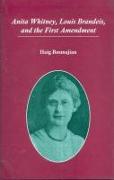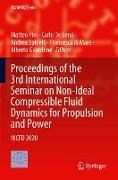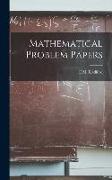- Start
- Anita Whitney, Louis Brandeis, and the First Amendment
Anita Whitney, Louis Brandeis, and the First Amendment
Angebote / Angebote:
This book explains why Supreme Court Justice Brandeis's concurring opinion in Whitney v. California remains a distinct rhetorical masterpiece and also explores the context and frame of Anita Whitney's social and political activism during the early twentieth-century Red Scare, now largely forgotten. The lives of the activist and the judge converged in 1927 when Whitney's 1920 conviction for violating California's Criminal Syndicalist Act led to Brandeis's now classic opinion that bears her name. This book also tells the story of the "radical" Anita Whitney, "clubwoman-Mayflower descendent, " Wellesley graduate, socially prominent communist who was tried, convicted, and sentenced to serve time in San Quentin prison before she was pardoned by the governor of California. The evolution of Brandeis's eloquent concurring opinion that accompanied the unanimous decision against Whitney and simultaneously undermined it, has its own complex history in that it converges and develops the ideas and arguments of two of Brandeis's opinions: Ruthenberg v. Michigan and Whitney v. California. The Whitney opinion may never have become a major statement about First Amendment rights had communist Charles Ruthenberg not died at the time Whitney was being decided. Brandeis's opinion is alive today, while the majority opinion has been rejected by the High Court in 1969: "Whitney has been thoroughly discredited" and "overruled." There is a universality and timelessness in the efforts to silence "heretics" and "witches." The Red Scare of 1919-1920 led to the arrest, trial, and conviction of Anita Whitney who was defined as a threat to the stability and security of the state and nation. In 1927, however, Brandeis warned in his Whitney opinion that "fear breeds repression, repression breeds hate" and he told us that historically "men feared witches and burnt women." The American twentieth century had its share of "witch hunts" where the "witches" were socialists, communists, anarchists, and anyone else considered suspect in thought
Folgt in ca. 15 Arbeitstagen


